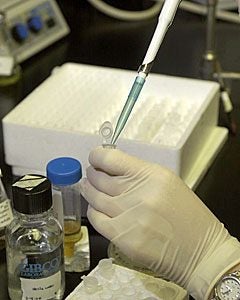Seven projects receive nearly $254,000 in Brody Brothers research grants
GREENVILLE, N.C. — Research projects led by faculty at the Brody School of Medicine at East Carolina University, including one that exposes medical students to a summer of investigation, have received grants totaling $253,929 from the Brody Brothers Foundation Endowment Fund.
“These all address the major disease issues of eastern North Carolina, which include cancer, heart disease, diabetes and obesity,” said Dr. John Lehman, associate dean for research and graduate studies at the Brody School of Medicine.

The research projects are aimed at the major health problems of eastern North Carolina.
The grants were made possible through the income from an endowment established at the ECU Medical & Health Sciences Foundation by the Brody Brothers Foundation. The following researchers received grants:
–Drs. Carlos Campos, Ron Allison and Claudio Sibata of the Department of Radiation Oncology received $40,000 to test a device to measure radioactive sources used in high-dose-rate brachytherapy, a form of cancer treatment. The device will allow cancer centers to double-check the radiation level of radioactive sources obtained from a national laboratory to make sure they are not over- or underdosing patients.
–Dr. Joseph Cory of the Department of Biochemistry and Molecular Biology received $25,129 to study factors influencing chemotherapy directed at ribonucleotide reductase, an enzyme. Drugs that block the activity of ribonucleotide reductase block DNA synthesis and tumor cell division. Cory’s study focuses on understanding what controls ribonucleotide reductase activity and how to exploit the ribonucleotide reductase site as an anti-tumor drug target.
–Dr. James DeVente of the Deparment of Obstetrics and Gynecology and Dr. Edward Seidel of the Department of Physiology received $40,000 to study the role of visfatin, a recently discovered chemical messenger, in women during pregnancy. Visfatin, like insulin, stimulates glucose transport into target cells such as fat. Thus, drugs that mimic visfatin action could substitute for insulin and bypass insulin resistance.
–Dr. Warren Knudson of the Department of Anatomy and Cell Biology received $48,300 to study the function of CD44, a protein, in a unique population of cancerous cells termed “tumor stem cells.” These cells divide slowly, are not susceptible to most chemotherapeutic therapies and can repopulate tumors with new cancer cells. The goal of this grant is to isolate an enriched population of human tumor stem cells and determine whether the CD44 expressed by these cells differs structurally or functionally from CD44 associated with many other cell types. The identification of a unique CD44 structure or function may help the development of strategies to target this dangerous cell type.
–Dr. Mark Mannie of the Department of Microbiology and Immunology and Drs. Robert Lust and Jitka Virag of the Department of Physiology received $32,000 to study anti-inflammatory treatments for myocarditis. The research will focus on experimental autoimmune myocarditis, or inflammatory heart disease, to understand how certain bacterial or viral infections may result in inflammatory heart disease. Moreover, the research is designed to develop a new class of vaccines to reverse inflammatory disease of the heart.
–Dr. Alexander Murashov of the Department of Physiology received $15,000 to study microRNA in diabetic neuropathy, the painful nerve damage caused by diabetes. MicroRNA are single-strand RNA molecules that regulate gene expression. Among other goals, this project will determine the therapeutic value of microRNAs in repairing nerve damage caused by diabetic neuropathy.
–Dr. Maria Ruiz-Echevarria of the Department of Biochemistry and Molecular Biology received $33,500 to study new targets and mechanisms for prostate cancer treatment. The objectives of this project are to understand the molecular mechanism underlying prostate cancer progression, confirm new targets for prostate cancer treatment an